Talking SOP September 2012 [PDF, 673.84 Kb] - Tessenderlo Group
Talking SOP September 2012 [PDF, 673.84 Kb] - Tessenderlo Group
Talking SOP September 2012 [PDF, 673.84 Kb] - Tessenderlo Group
Create successful ePaper yourself
Turn your PDF publications into a flip-book with our unique Google optimized e-Paper software.
Sulphate of Potash news from <strong>Tessenderlo</strong> <strong>Group</strong> <strong>September</strong> <strong>2012</strong><br />
<strong>Tessenderlo</strong> <strong>Group</strong>’s Inorganics<br />
Business Unit welcomes Sophie<br />
Haan as its new director<br />
At the beginning of April <strong>2012</strong>, Sophie Haan took over as the director of the<br />
Inorganics Business Unit, which comprises the company’s potassium sulphate<br />
fertilizer and feed phosphates businesses.<br />
In a recent interview Sophie<br />
Haan gave us a brief summary<br />
of her career to date, along with<br />
a overview of the challenges and<br />
opportunities that lie ahead for<br />
Business Unit Inorganics.<br />
Can you give us an overview<br />
of your career prior to joining<br />
<strong>Tessenderlo</strong> <strong>Group</strong>?<br />
I graduated with an MBA in<br />
Business Management from the<br />
Said Business School at the<br />
University of Oxford. I started<br />
my career in various supply<br />
chain roles, first with Dupont<br />
de Nemours and later with<br />
Accenture.<br />
I joined <strong>Tessenderlo</strong> <strong>Group</strong> at the beginning of<br />
2009 as Sustainability Project Manager and later<br />
took up the position of Global Marketing Manager<br />
for the group’s Gelatin Business. In this role I was<br />
responsible for global marketing strategy and<br />
business development, as well as innovation.<br />
Of course I was delighted to<br />
accept the position of Business<br />
Unit Director Inorganics earlier<br />
this year and am looking forward<br />
to shaping the business in line<br />
with the group’s future strategic<br />
direction.<br />
How is the economic crisis<br />
in Europe affecting the<br />
group’s <strong>SOP</strong> business?<br />
As a result of the crisis, the trade<br />
sector remained cautious in its<br />
stocking-up of fertilizers at the<br />
beginning of <strong>2012</strong>. In addition,<br />
adverse weather conditions in<br />
many countries led to a delay<br />
in the spring season in Europe.<br />
For example, deliveries of potash fertilizers in<br />
France were down 25% in 2011/12 compared to<br />
the previous season according to UNIFA data.<br />
Inevitably this has had an impact on the first half<br />
performance of the business. In contrast, the<br />
market in Latin America has been much more<br />
buoyant and our <strong>SOP</strong> sales in this region have<br />
increased significantly during the first half of <strong>2012</strong><br />
compared to the same period in 2011. This is also<br />
true for our sales into sub-Saharan Africa.<br />
What are the current challenges faced by the<br />
<strong>SOP</strong> business?<br />
The ongoing economic crisis in Europe, along<br />
with various political issues in North Africa and<br />
the Middle East continue to challenge our <strong>SOP</strong><br />
business. Our main objective at present remains<br />
the growth of our premium grade products.<br />
For our SoluPotasse ® water soluble <strong>SOP</strong>, this<br />
means continuing to invest in order to ensure that<br />
our product remains of the best quality and the<br />
market leader. On top of this, we are now putting<br />
a lot of effort into developing our new foliar grade<br />
<strong>SOP</strong>, which is being marketed as K-Leaf.<br />
In this issue<br />
Groundnuts: a highly nutritious<br />
crop with a variety of uses p2,3<br />
Inorganics Customer Services<br />
Team moves to new offices p4<br />
K-Leaf TM promoted<br />
to Russian farmers<br />
<strong>Tessenderlo</strong> <strong>Group</strong> was present in the village of<br />
Palyonka in the Lipetsk region of Russia in July<br />
to participate in the 4 th International Agrofestival,<br />
organized and sponsored by Agroprom MDT.<br />
In partnership with Agroprom MDT, the group has<br />
been conducting trials of its new K-Leaf foliar<br />
grade of <strong>SOP</strong> with a<br />
variety of broad-acre<br />
crops such as sugar<br />
beet, potatoes, oilseed<br />
rape and soya. Results<br />
from the last two<br />
seasons have shown<br />
that including foliar<br />
sprays of K-Leaf in a<br />
treatment programme<br />
has a positive effect on<br />
both yield and quality.<br />
Visitors to the exhibition were able to view this<br />
season’s trials with K-Leaf and question the<br />
<strong>Tessenderlo</strong> <strong>Group</strong> team on the benefits of<br />
the new product and also find out more about<br />
SoluPotasse ® , the group’s water-soluble fertilizer<br />
for use in fertigation.<br />
(cont. page 4)<br />
K-Leaf TM SoluPotasse ® GranuPotasse ® Standard <strong>SOP</strong>
Groundnuts:<br />
a highly<br />
nutritious<br />
crop with<br />
a variety<br />
of uses<br />
Groundnuts, or peanuts as they are<br />
often called, serve two major purposes.<br />
About half the world’s production is<br />
industrially processed for oil; the other<br />
half is for direct consumption providing<br />
a valuable source of protein, fat and<br />
minerals. Many third world countries are<br />
among the top 10 groundnut producers<br />
and it is clear that the crop generates a<br />
valuable cash income for many poor<br />
farmers in the developing world,<br />
especially in Sub-Saharan Africa and<br />
Asia. Since groundnuts are often grown<br />
in arid conditions, their fertilization<br />
requires special attention.<br />
Main groundnut cropping and<br />
production areas<br />
Country Production Area<br />
(1,000 tons) (1,000 ha)<br />
China 16.000 4.650<br />
India 5.500 5.300<br />
United States 1.649 444<br />
Nigeria 1.550 1.245<br />
Burma 1.300 850<br />
Indonesia 1.250 750<br />
Argentina 1.050 325<br />
Sudan 850 1.000<br />
Senegal 700 1.000<br />
Others 5.606 5.353<br />
Source: USDA<br />
The groundnut (Arachis hypogaea) is in fact a<br />
leguminous crop forming part of the “bean” family<br />
(Fabaceae). The oldest specimens, discovered in<br />
Peru, are 7,600 years old, however it is believed<br />
that the first groundnuts were cultivated in Bolivia,<br />
Paraguay or Brazil.<br />
Later, the crop spread throughout Mesoamerica<br />
and its Spanish conquerors brought the first<br />
groundnuts to Europe. European traders then<br />
introduced them into Asia and Africa. Finally,<br />
African slaves brought the crop to Northern<br />
America in the 1700s.<br />
Groundnut growth and harvesting<br />
Groundnut seeds are lodged just a few<br />
centimetres below the soil’s surface and the<br />
young plants usually emerge within a few weeks<br />
of planting. Flowering starts 30 to 40 days later.<br />
After self-pollination of the flowers, the stalk below<br />
the fertilized plant ovary elongates and curves<br />
downward towards the soil while the flowers<br />
wither. Later the stalk tip enlarges and pod and<br />
seed development begin. The nut then matures<br />
over the next 9 to 10 weeks. The pods ripen 120<br />
to 150 days after the seeds are planted.<br />
Groundnut harvesting generally takes place<br />
when the foliage begins to yellow. The plants are<br />
separated from the roots and are allowed to dry<br />
for several days, enabling the nuts to lose slightly<br />
less than a third of their original moisture content.<br />
After the nuts have dried sufficiently they are<br />
threshed, removing the pods from the rest of the<br />
bush. If the crop is harvested too early, the pods<br />
will be unripe. If they are harvested late, the pods<br />
will snap off at the stalk and will remain in the soil.<br />
Groundnut cropping<br />
Groundnuts should be grown in rotation with<br />
cereals such as maize or sorghum, which have<br />
been well fertilized, because they respond better<br />
to fertilizer applied to the previous crop rather<br />
than to the groundnuts themselves. Little nitrogen<br />
fertilization is normally required since atmospheric<br />
nitrogen is fixed in the root nodules.<br />
Basal applications of fertilizers are broadcast prior<br />
to planting. Depending on soil tests, recommended<br />
application rates vary from 10-30 kg N/ha, 40-90<br />
kg P 2<br />
O 5<br />
/ha and 40-90 kg K 2<br />
O/ha. Additionally, 250<br />
kg CaO/ha is often applied at bloom to prevent<br />
the formation of empty shells.<br />
K-Leaf TM SoluPotasse ® GranuPotasse ® Standard <strong>SOP</strong>
A loose sandy soil with good drainage and a pH<br />
ranging from 5.3 to 6.5 is preferred.<br />
Potassium - a vital element<br />
Potassium is a key element for the plant’s<br />
metabolism. It contributes to the development of<br />
proteins, enzymes and vitamins as well as to plant<br />
photosynthesis. Furthermore, potassium plays an<br />
essential role in transport systems within the plant<br />
and it improves water use efficiency. It is therefore<br />
necessary to ensure adequate potassium<br />
availability in the field through soil testing. If soil<br />
testing reveals there is little potassium available,<br />
there will be a need to apply additional potassium<br />
fertilizer. In light soils it is recommended that<br />
potassium is applied in two split doses to minimize<br />
loss due to leaching in heavy rainfall conditions.<br />
(DAP), and organic pesticides containing very little<br />
sulphur, as well as the low presence of sulphur in<br />
the soil in regions where groundnuts are produced.<br />
Sulphur deficiency is characterized by stunted<br />
growth and young leaves are small and yellowishgreen.<br />
Nodulation and pod formation is restricted<br />
and maturity of the seeds is delayed. In cases of<br />
severe deficiency, the leaves become papery.<br />
<strong>SOP</strong> for higher yield and improved quality<br />
Sufficient potassium fertilization may improve the<br />
number of pods per plant, but also their size and<br />
pod filling, as shown in the graph below from a<br />
trial in China.<br />
Fig. 1: Effect of K fertilization on pod size<br />
and number<br />
Fig. 2: Effect of K fertilization on oil yield<br />
and content<br />
Pod weight<br />
No. pods<br />
Yield<br />
Content<br />
Potassium deficiency in a groundnut plant<br />
Lack of potassium causes stunted plants with<br />
small branches and reduced vigour. The leaves of<br />
potassium-deficient plants do not grow normally<br />
and appear irregular in shape. In mature leaves a<br />
yellowish-green color can be observed, spreading<br />
from the leaf apex along the leaf margins to the<br />
middle of the leaf, while the areas around the vein<br />
remain normal. In severe cases, the leaves appear<br />
dry and scorched at the edges and the leaf<br />
surface is irregularly chlorotic. Symptoms usually<br />
appear within five weeks of planting. Because<br />
of leaching, potassium deficiency is particularly<br />
prevalent in light soils.<br />
Source: Northern China, 1995<br />
Additionally, groundnuts are known to be a<br />
chloride sensitive crop. Since excessive chloride<br />
may impede growth and decrease yield, use<br />
of potassium chloride (MOP) as a potassium<br />
source is best avoided. Potasium sulphate (<strong>SOP</strong>)<br />
provides the plant with sulphur, thereby improving<br />
both yield and quality.<br />
Further experiments in China on sandy soil with<br />
low sulphur content for example indicate a 8%<br />
higher yield when <strong>SOP</strong> is used compared to<br />
MOP. Trials conducted in Egypt in 1999 indicate<br />
that <strong>SOP</strong> not only improves yield, but also the<br />
oil content of the pods is higher. As illustrated in<br />
Fig. 2, application of 180 kg K 2<br />
O/ha increases<br />
groundnut oil content by 9%.<br />
Source: Egypt, 1999<br />
Cost-effective improvement: foliar <strong>SOP</strong><br />
application<br />
Recent studies demonstrate the benefits of foliar<br />
application of <strong>SOP</strong> in groundnut production.<br />
K-Leaf, <strong>Tessenderlo</strong> <strong>Group</strong>’s new, rapidly<br />
dissolving <strong>SOP</strong>, has been designed especially for<br />
foliar application. Foliar application of K-Leaf<br />
not only cures or prevents potassium and sulphur<br />
deficiency efficiently, but can also enhance<br />
potassium uptake by the plant roots.<br />
Fig 3. Effect of <strong>SOP</strong> foliar application<br />
on yield<br />
Mt/ha<br />
Sulphur deficiency in a groundnut plant<br />
NP NPK 100%<br />
soil<br />
Source: ARC Egypt, 2011<br />
NPK 50% soil<br />
+ 2 foliar app.<br />
Sulphur also plays an important role in the<br />
metabolism of groundnut plants. It is essential<br />
for the synthesis of proteins, plays a key role in<br />
chlorophyll formation and assists in biological<br />
oxidation-reduction processes. In recent years,<br />
sulphur deficiency in groundnut production has<br />
become an issue due to the use of high quality<br />
fertilizers, such as di-ammonium phosphate<br />
Additionally, efficient absorption of both potassium<br />
and sulphur through the plant’s foliage improves<br />
yield. Interestingly, trials in Egypt demonstrate that<br />
higher yields can be achieved by combining half<br />
the usual dose of <strong>SOP</strong> applied to the soil with two<br />
foliar applications, compared to a full dose soil<br />
application.<br />
K-Leaf TM SoluPotasse ® GranuPotasse ® Standard <strong>SOP</strong>
Inorganics Business<br />
Unit Director Sophie<br />
Haan (cont.)<br />
How does the fertilizer business fit in with the<br />
group’s chosen strategic direction?<br />
Global mega trends like a growing world population<br />
and a continued increase in wealth and consumption<br />
lead to a rising demand for food, but agricultural<br />
land is not increasing. <strong>Tessenderlo</strong> <strong>Group</strong>’s chosen<br />
strategy is to focus on those businesses that<br />
provide solutions to such challenges. The company<br />
has a portfolio of innovative products that can<br />
improve crop yields and quality, while contributing<br />
to sustainable agriculture.<br />
Water availability is also increasingly an issue<br />
globally and in many countries there is competition<br />
for water between agricultural and human<br />
consumption. Farmers are being forced to use<br />
water more efficiently and SoluPotasse® is widely<br />
used throughout the world in drip irrigation systems<br />
to provide cost-effective, water-efficient fertilization.<br />
Inorganics Customer Services<br />
Team moves to new offices at Ham<br />
The Supply Chain Team, which includes the<br />
Customer Services, moved into the new offices<br />
in July, from where they will have much closer<br />
contact with the production teams already on<br />
the site at Ham.<br />
The Customer Services Team for the Inorganics<br />
Business Unit is led by Heidi Castro and is<br />
CSR contact Telephone Region/business Sales manager(s)<br />
Evy Soentjens +32 13 611921 Australia, New Zealand Ben Brems<br />
Canada<br />
Denis Clement<br />
Tolling<br />
Roger Le Long<br />
Asia (except India) Denis Clement/Ben Brems<br />
Algeria<br />
Roger Le Long<br />
Morocco & Tunisia François Berhocoirigoin<br />
Katrien Bylemans +32 13 611918 Tolling Roger Le Long<br />
Middle East<br />
Roger Le Long/Denis Clement<br />
India, Rest of Africa Denis Clement/Ben Brems<br />
Trade of calcium nitrate Frank Ruyseveldt/Piotr Sykut<br />
Leentje Cardinaels +32 13 611919 South America Denis Clement<br />
Cyprus, Turkey, Greece Roger Le Long/Denis Clément<br />
Annick Sannen +32 13 611915 Spain, Portugal Juan Lorente<br />
Liquid fertilizers<br />
Ben Brems<br />
Mexico<br />
Denis Clement<br />
Bjorn Borgers +32 13 611920 France (export) François Berhocoirigoin<br />
Brazil<br />
Denis Clement<br />
East-Europe (sea shipment) Denis Clement/Piotr Sykut<br />
Peggy Verboven +32 13 611916 UK Ben Brems/Roger Le Long<br />
Petula Latet +32 13 611917 Italy Lodovica Boggian<br />
Els Stuyck +32 13 611914 France François Berhocoirigoin/Christophe Luittre<br />
Linda Van Balen +32 13 611911 Belgium Ben Brems/Roger Le Long<br />
Jacques Jepps +32 13 611910 East-Europe (truck), Roger Le Long/Ben Brems/Piotr Sykut<br />
Germany, Holland, Austria<br />
Switzerland, Finland, François Berhocoirigoin<br />
Denmark<br />
In a continuing effort to bring the various departments of the Inorganics Business Unit<br />
closer together, <strong>Tessenderlo</strong> <strong>Group</strong> has invested in a new building on the group’s<br />
production site at Ham, the principal unit for <strong>SOP</strong> and phosphate production.<br />
made up of Customer Service Representatives<br />
(CSRs) who handle the complete end-to-end<br />
order process, from customer order intake<br />
through to shipment and invoicing. The CSRs<br />
remain at your disposal to handle order intakes,<br />
transport booking and call-offs, invoicing and all<br />
order-related questions.<br />
During the move the opportunity was taken to<br />
re-examine the responsibilities of each CSR,<br />
which are now shown in the table opposite.<br />
When placing orders and communicating with<br />
the Team, clients should continue to ensure that<br />
all correspondence is sent by e-mail, fax or post<br />
to the following centralised coordinates:<br />
e-mail: inorganics.sales@tessenderlo.com<br />
Fax: +32 2 6473692 (Spain: +34 91 4148628)<br />
Post: <strong>Tessenderlo</strong> Chemie N.V.<br />
Department OTC (Inorganics)<br />
32 Bergstraat, B-3945, Ham, Belgium.<br />
The Supply Chain Team has also made some<br />
changes to the procedure for handling complaints<br />
in order to ensure that problems are addressed<br />
quickly and efficiently. The first change becomes<br />
effective immediately and concerns the rerouting<br />
of all communication to one generic mailbox:<br />
complaints@tessenderlo com.<br />
In the event of a claim or complaint, customers<br />
should communicate directly with this mailbox.<br />
All communication regarding existing claims or<br />
complaints should mention the corresponding<br />
reference in the subject title of the e-mail.<br />
Supply Chain Manager, Joris Diddens, states<br />
“The move now brings all the Supply Chain<br />
departments into one building close to our<br />
principal production facilities. It shortens the<br />
communication lines and brings the Team closer<br />
to colleagues in production, improving the level<br />
of service we can offer our customers.”<br />
More information on <strong>Tessenderlo</strong> <strong>Group</strong>’s activities can be found at:<br />
www.tessenderlogroup.com<br />
<strong>Tessenderlo</strong> <strong>Group</strong> Fertilizers<br />
giving nature a helping hand<br />
www.sopib.com<br />
<strong>Tessenderlo</strong> <strong>Group</strong><br />
Troonstraat, Rue du Trône 130 B-1050 Brussels, Belgium<br />
Tel: + 32 2 639 1858 Fax: + 32 2 639 1713<br />
www.tessenderlogroup.com<br />
fertilizers@tessenderlo.com<br />
SoluPotasse ® and GranuPotasse® are registered trademarks of <strong>Tessenderlo</strong> Chemie NV/SA.<br />
K-Leaf TM is a trademark of <strong>Tessenderlo</strong> Chemie NV/SA.


![Talking SOP September 2012 [PDF, 673.84 Kb] - Tessenderlo Group](https://img.yumpu.com/37691694/1/500x640/talking-sop-september-2012-pdf-67384-kb-tessenderlo-group.jpg)
![Slides [PDF, 378.59 Kb] - Tessenderlo Group](https://img.yumpu.com/49205668/1/190x143/slides-pdf-37859-kb-tessenderlo-group.jpg?quality=85)
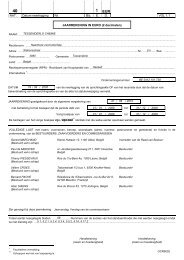
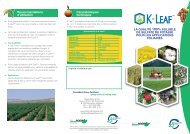
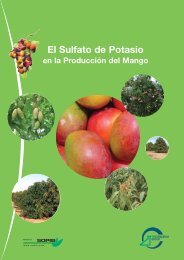
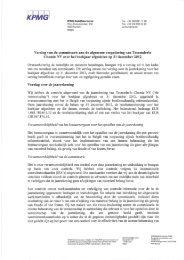
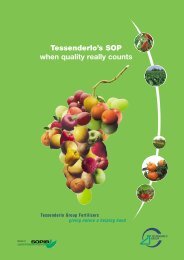
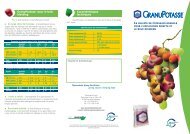
![Investor Seminar Presentation [PDF, 997.72 Kb] - Tessenderlo Group](https://img.yumpu.com/45992427/1/190x143/investor-seminar-presentation-pdf-99772-kb-tessenderlo-group.jpg?quality=85)
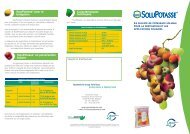
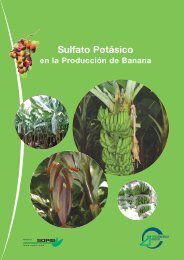
![Talking SOP May 2013 [PDF, 735.49 Kb] - Tessenderlo Group](https://img.yumpu.com/41045284/1/184x260/talking-sop-may-2013-pdf-73549-kb-tessenderlo-group.jpg?quality=85)
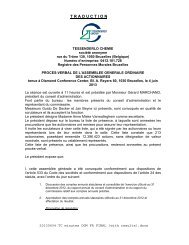
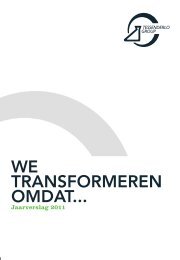
![Annual Report 2008 English [PDF, 2.69 MB] - Tessenderlo Group](https://img.yumpu.com/37691533/1/184x260/annual-report-2008-english-pdf-269-mb-tessenderlo-group.jpg?quality=85)